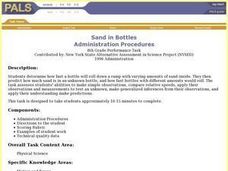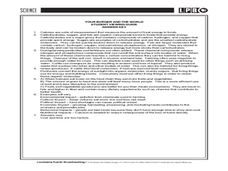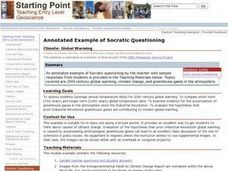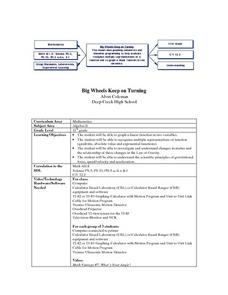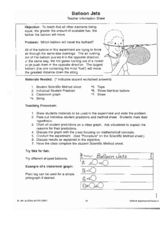Curated OER
Sand in Bottles
Eighth graders calculate the speed of bottles as they roll down a ramp with varying amounts of sand inside. Using their data, 8th graders estimate speed of three labeled bottles with different amounts of sand and compare those results...
Curated OER
Mapping Possible Solutions
Fourth graders propose possible sites for the heart of Florida state capital by mapping collected data onto a Florida state map and recording data in a Travel Log.
Curated OER
Biotechnology Laboratory Research
Students participate in an extended laboratory research to experience how scientific information is obtained, upon which we build scientific knowledge and understanding.
NASA
Just How Far is That Star?
Pupils often wonder how we know the distance to various stars. Starting with a thought experiment and progressing to a physical experiment, they determine the brightness and distance to various stars. The evaluation requires...
University of California
Hot! Hot! Hot!
Calories are not tiny creatures that sew your clothes tighter every night, but what are they? A science lesson, presented at multiple levels, has learners experiment with heat, heat transfer, and graph the function over time....
Curated OER
Finding Caterpillars
Young scholars examine how animals protect themselves from predators and camouflage themselves. They participate in a simulation in which they locate red and green yarn "caterpillars," organize their data, and generate a bar graph using...
Curated OER
Opinion Surveys
Students examine the factors that affect the accuracy of opinion surveys. They calculate probability and chance using data they have collected. They practice reading tables and graphs as well.
Curated OER
Fast Food: You Can Choose!
Students research the nutritional value of fast food. They assess which fast foods are best and worst to eat. They organize their data into tables and graphs and explain their findings to other students.
Curated OER
Annotated Example of Socratic Questioning: Climate: Global Warming
Learners compare and discuss short-term and longer-term global temperature data. They evaluate data from three sets of graphs and then participate in a structured whole class Socratic discussion on the possible causes of climate change.
Curated OER
Build Your Own Car
Young scholars design and build their own cars. In this physics lesson plan, students test their car's speed and make changes when necessary. They graph data and analyze results.
Curated OER
Monitoring Oxygen Level
Students measure oxygen percentages in room air and air exhaled after they perform various activities. They explore various websites, and record and analyze the data from the experiments.
Curated OER
Eyewitnesses to Change
Students explore recent changes in the Artic's climate that have been observed by Artic residents. They watch videos, take notes and create a concept map. They also look at historical weather data from a specific Artic community. The...
Curated OER
Mineral Exploration Using Remote Sensing
Students use quantitative data that they gather to figure out where there is an ore body in their model. They describe how geologists could use similar information in order to figure geologic patterns and geologic history for a specific...
Curated OER
Factors That Affect Climate
Fifth graders use captured portions of the Internet ("mininets") to perform research into climate. They create graphs of the data recorded using latitude as the independent variable and temperature as the dependent variable.
Curated OER
Flowers, Pods, and Seeds
Students gain an understanding of living organisms. the complete a plant growth data log to chart plant growth and to make observations, predictions, and personal reflections.
Curated OER
Famous Virginians
Fourth graders research a famous Virginian. They cite sources of the facts and data which they gather from a variety of sources. They present the material using PowerPoint and an oral presentation.
Monroe City Schools
Clouds! Clouds! Clouds!
Here is a beautiful lesson on clouds designed for your 1st graders. Learners study three different types of clouds. They construct drawings of cumulus, cirrus, and stratus clouds. The Cloud Book, by Tommie dePaola is used to...
Curated OER
For the Birds
Second graders observe, identify, and document birds sighted at the library feeder station. They observe and document birds in order to begin their birder's life list. They apply scientific concepts and principles by using library...
Virginia Department of Education
The Colligative Properties of Solutions
How can you relate colligative properties of solutions to everyday situations? Pupils first discuss the concepts of density, boiling and freezing points, then demonstrate how to accurately determine the boiling and freezing point of...
Curated OER
Big Wheels Keep on Turning
Eleventh graders work in groups and investigate how force determines the speed and distance then they view the video, "Math Vantage #7: What's Your Angle?." They are given a real life problem to solve using speed, ramps, angle, incline...
Curated OER
Scientific Notation III: Linear vs Exponential
Students after investigating examples of exponential growth students have an intuitive feel for the concept of exponential growth of a system.
Curated OER
What is a Seed?
First graders identify the parts of a seed. In this plant biology instructional activity, 1st graders are given a seed and identify each part of the seed by using a hand lens. Students plant a seed and graph the growth.
Curated OER
Pedestrian Safety for Students
Students create a spreadsheet. For this spreadsheet lesson, students take the responses they received from a pedestrian safety survey to create their spreadsheet. Then they turn this information into a graph.
Curated OER
Balloon Jets
Students investigate how fuel amount affects the distance traveled by balloons. In this physics lesson, students collect data and create a pictograph. They interpret data and formulate a conclusion.
